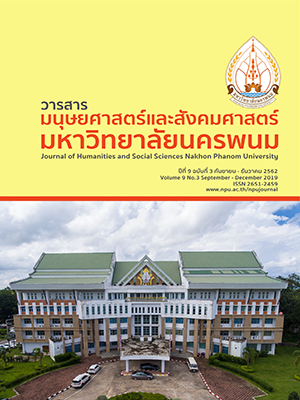A Study of Learning Management Model to Support Reasoning Abilities and Mathematics Connection Abilities of Muthayomsueksa 3 Students
Main Article Content
Abstract
The purposes of this study were: 1) to develop learning management model for reasoning abilities and mathematics connection abilities, 2) to study for the results of implementing of that learning management model. In this study was provided by Research and Development methodology, which composed of three phases, for the first phase was studying of prior information and current state in learning management to promote the student’s reasoning and connection abilities in mathematics learning. The second phase, developing the learning management model. and for the third phase was implementing the effectiveness of model. The samples in studying for the effectiveness of model were consisted of two groups of the students in Muthayomsueksa 3. The samples in studying for the effectiveness of model were consisted of two groups of the students in Muthayomsueksa 3 from Bannongweangnoi school.The instruments used in this study were: 1) the learning management model for reasoning abilities and mathematics connection abilities, 2) lesson plan assessment, 3) reasoning and connection abilities test. The statistics were used in this study consisted of t-test (Dependent-sample), F –test (One-way MANOVA) to employ in testing hypotheses.
The research results were as follows: The development of learning management model for reasoning abilities and mathematics connection abilities of muthayomsueksa 3 student composed of: 1) Principles, approaches, and concerned theories, 2) The purpose of model, 3) Learning process, 4) Social system, 5) The principle of responding and, 6) Support system. Whereas, learning management model was created based on Constructivism psychology, Heuristics, Reflection, and Open approach. Which learning process composed of four steps and those were: 1) Coping and analyzing problem, 2) Idea Finding, 3) Conduction, and 4) Discussing and summarizing. The results of model evaluation were met the requirement.For the results of implementing model, were found that: The students who learned based on learning management model revealed higher of reasoning and connection in mathematics learning than before learning at the .05 level of significance. Moreover,The students who learned based on learning management model revealed higher of reasoning and connection in mathematics learning than group of students who learned using traditional approach, at the 0.05 level of significance.
Article Details
References
คณิตศาสตร์สู่สถานการณ์โลกจริง ที่มีต่อผลสัมฤทธิ์ทางการเรียนความสามารถในการแก้ไขปัญหาและเจตคติต่อ
วิชาคณิตศาสตร์. วิทยานิพนธ์วิทยาศาสตร มหาบัณฑิต. ชลบุรี : มหาวิทยาลัยบูรพา.
กระทรวงศึกษาธิการ. (2551). หลักสูตรแกนกลางการศึกษาขั้นพื้นฐาน พุทธศักราช 2551. กรุงเทพฯ : โรงพิมพ์ชุมนุมสหกรณ์
การเกษตรแห่งประเทศไทย จำกัด.
กุลกาญจน์ สุวรรณรักษ์. (2556). ผลสัมฤทธิ์และเจตคติการเรียนคณิตศาสตร์ เรื่อง การชั่งและการตวงของนักเรียน
ชั้นประถมศึกษา ปีที่ 3. ปริญญานิพนธ์ กศ.ม. (การประถมศึกษา). กรุงเทพ : มหาวิทยาลัยศรีนครินทรวิโรฒ.
เกวลิน ชัยณรงค์. (2555). การศึกษาสภาพและปัญหาการจัดการเรียนการสอนคณิตศาสตร์ในโรงเรียนมัธยมศึกษา สังกัด
สำนักงานคณะกรรมการการศึกษาขั้นพื้นฐาน. วารสารอิเล็กทรอนิกส์ทางการศึกษา. กรุงเทพมหานคร.
พรรณทิภา ทองนวล. (2554). ผลของการจัดการเรียนรู้อย่างมีชีวิตชีวาโดนเน้นการใช้ตัวแทนที่มีต่อผลสัมฤทธิ์ทางการเรียน
ความสามารถในการให้เหตุผลและความสามารถในการสื่อสารทางคณิตศาสตร์ เรื่อง ความสัมพันธ์และฟังก์ชัน
ของนักเรียนชั้นมัธยมศึกษาปีที่ 4.ปริญญานิพนธ์ กศ.ม.(การมัธยมศึกษา).กรุงเทพฯ:
มหาวิทยาลัยศรีนครินทรวิโรฒ.
สถาบันส่งเสริมการสอนวิทยาศาสตร์และเทคโนโลยี. (2551). ทักษะ/กระบวนการทางคณิตศาสตร์. (พิมพ์ครั้งที่2). กรุงเทพฯ :
ส เจริญการพิมพ์.
. (2555). คณิตศาสตร์มืออาชีพ เส้นทางสู่ความสำเร็จ. กรุงเทพฯ : บริษัท 3-คิว มีเดีย จำกัด.
สุวรรณา ตั้งแก้ว. (2556). ผลการจัดกิจกรรมโครงงานคณิตศาสตร์เรื่องความคล้ายที่มีต่อ ผลสัมฤทธิ์ทางการเรียนคณิตศาสตร์
และความสามารถในการเชื่อมโยงทางคณิตศาสตร์ของ นักเรียนชั้นมัธยมศึกษาปี ที่ 3.วิทยานิพนธ์ กศ.ม.
มหาวิทยาลัยสุโขทัยธรรมาธิราช.
อัมพร ม้าคนอง. (2559). ทักษะและกระบวนการทางคณิตศาสตร์: การพัฒนาเพื่อพัฒนาการ. กรุงเทพฯ : ศูนย์ตำราและ
เอกสารทางวิชาการ คณะครุศาสตร์จุฬาลงกรณ์มหาวิทยาลัย.
Baroody, Arthur J. (1993). Problem Solving, Reasoning, and Communicating, K-8 : Helping Children Think
Mathematically. New York :Macmillan.
Ben Adesina Adegoke. (2013). Modelling the Relationship between Mathematical Reasoning Ability and
Mathematics Attainment. Journal of Education and Practice. 54 – 61.
National Council of Teacher of Mathematics. (2000). Principles and Standards for School Mathematics.
Reston, Virginia: National Council of Teachers of Mathematics.


